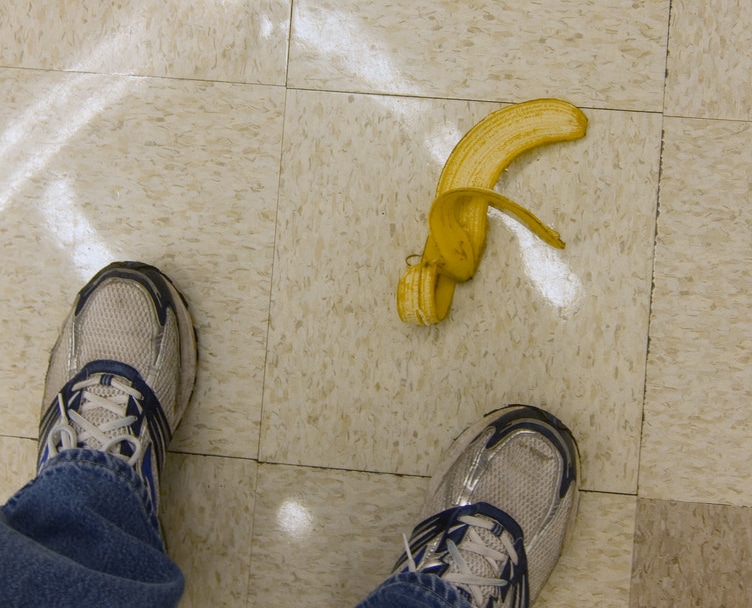
Slip and fall or trip and fall accidents are so commonplace that they may not sound serious. Most of us have tripped on a step or slipped on an icy sidewalk. Often, the consequences are slight—we catch ourselves, or take a spill that results in nothing more than momentary pain or injured pride. Unfortunately, slip and fall accidents can be much more serious. One moment, a slip and fall victim is walking up a sidewalk or down the aisle in a retail store, and the next he or she is seriously injured.
Falls are especially dangerous for those 65 and older: nationwide, emergency rooms treat about five older Americans for fall-related injuries every minute. About three older people die of injuries sustained in a fall every hour.
Slip and fall accidents happen in many different ways, sometimes through the victim’s own carelessness or inattention. However, slip and fall injuries often result from negligent property maintenance or inadequate warnings. Some common scenarios that lead to slip and fall lawsuits include:
Of course, this is only a sampling of common slip and fall causes. Any time a surface is poorly maintained, a carpet isn’t tacked down properly, a floor is left wet or slick, debris is left in a pathway, or negligence of the property owner or occupier contributes to a fall, the negligent party may be liable for damages. Unlike many other states, New Hampshire extends this protection to virtually anyone on the property, including trespassers.
Under New Hampshire law, an injury victim who was himself or herself party responsible for the accident may still be able to recover damages from other responsible parties, such as the property owners. If the injured party is not more than 50% responsible, he or she may recover proportionate damages.
For example, if the court determines that the property owner was 70% responsible for the incident due to faulty maintenance, but that the injury victim was 30% responsible due to inattention, the property owner may be liable for 70% of the victim’s damages.
Every personal injury case is different, and slip and fall cases are no exception. Compensation varies depending on a wide variety of factors, including degree of fault, extent of injuries, economic losses, and even factors such as the age and prior earning capacity of the victim.
Some common types of damages awarded in slip and fall / trip and fall cases include:
A New Hampshire personal injury attorney with experience in slip and fall cases can provide a clearer idea of the types of damages that may be available in your specific case.
The general statute of limitations for personal injury claims in New Hampshire is three years. However, that doesn’t mean that it’s a good idea to delay talking with a local personal injury lawyer. Some reasons to act quickly include:
If you’ve been injured when you slipped or tripped and fell on someone else’s property, it is in your best interest to get knowledgeable guidance as soon as possible. You can schedule a free consultation with attorney Kevin Broderick by calling 978-459-3085 or completing our contact form.
Let Attorney Kevin Broderick answer your questions and evaluate your personal injury or vehicle accident case for free!
The information you obtain on this site is not, nor is it intended to be, legal advice. You should consult an attorney for advice regarding your individual situation. We invite you to contact us and welcome your calls, letters, and electronic mail. Contacting us does not create an attorney-client relationship. Please do not send any confidential information to us until such time as an attorney-client relationship has been established.
Slips and falls and trips and falls happen in many different ways. Some common examples involve uneven surfaces, snow and ice that hasn’t been properly cleared, loose carpeting, liquid spilled on a floor, or any other condition that can cause a hazard when walking.
Responsibility for a slip and fall or trip and fall depends on the specific circumstances. A property owner isn’t automatically responsible just because the accident happened on their property–they must have failed in their responsibility to the injured person. Some falls also happen in part because the injured person wasn’t paying attention. When that’s the case, the amount of compensation available may be reduced.
The best source of information about who may be responsible for your slip and fall injury is to talk to an experienced slip and fall attorney as soon as possible.
In New Hampshire, the duty to exercise due care to keep property safe for visitors and to remedy or warn of any known dangerous conditions extends to social hosts. That means your friend may be liable for any injuries you sustained if you fell because their property was unsafe. Many people are hesitant to ask friends for compensation, let alone pursue a lawsuit. Often, though, the friend’s homeowners’ insurance will cover the injury.
If your friend lives in an apartment building and you are injured due to dangerous conditions in a common area like a stairwell or hallway, the property owner/manager may be responsible.